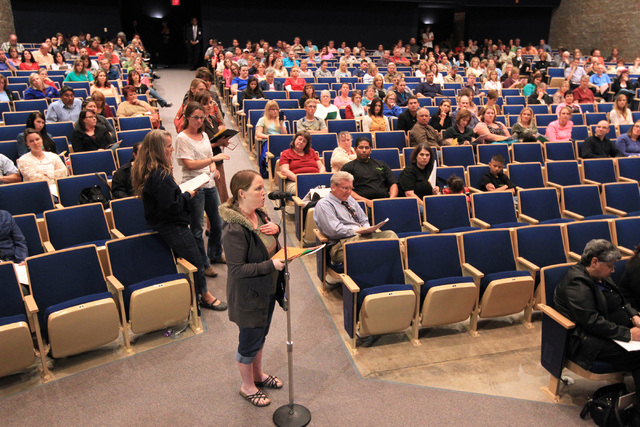Sex education discussion delay angers Clark County School Board member

Months after Clark County School District leaders apologized for mishandling potential changes to the sex education curriculum, the unexpected cancellation of a School Board meeting to discuss related policy revisions left at least one board member fuming.
At the request of District F Trustee Carolyn Edwards, a longtime advocate of amending the district’s sex education policies to make them more inclusive, the agenda for the board’s Thursday meeting included an item to reconsider the curriculum changes. An additional agenda item allowed for discussion on whether trustees support the elimination of a state mandate requiring a parent signature for students to enroll in a sex education course.
Neither item required, or even mentioned, a vote or official action.
Still, district leaders agreed Monday to cancel the meeting, worried that simply discussing those controversial topics during summer break would convince critics that the board intentionally scheduled a debate at a time when parents were out of town for family vacations.
“I’m furious,” said Edwards, who at a June 15 meeting requested the board revisit its sex education policy soon. “This is an attempt to thwart a discussion on the items.
“I was asked to wait to bring these items back in September, but I will not wait.”
Not long after Edwards first joined the board in 2006, she unsuccessfully called for a vote to amend the sex education curriculum.
Now, with different trustees on the board, she hopes to raise the issue again but said she couldn’t predict the outcome.
“I’m not sure what to expect this time,” Edwards said this week. “But we should, at the very least, take a vote to know where everyone stands.”
That probably won’t happen until September or October, according to board President Linda Young.
Young decided to cancel the meeting after learning that Superintendent Pat Skorkowsky, board counsel Mary Ann Miller and District E Trustee Patrice Tew, who serves as board liaison for the district’s Sex Education Advisory Committee, all would be absent.
Young suggested that, in the spirit of inclusion, it would be better to delay discussion of sex education until families return home before the start of school this fall.
“There’s not always a lot of trust with the school district,” Young said.
“So if you put something at the end of June, and people aren’t available to attend because of summer events and activities,” she added, “we thought it would be more prudent and we would act a bit more sensitively if we could get a date and time when people would not unfairly accuse us of moving ahead without giving consideration to hectic schedules.”
Sex education in Clark County schools has remained on the back burner since a public outcry last fall, when the district held a series of invitation-only community input meetings about possible changes to the curriculum.
At the meetings, the district presented a 77-page curriculum guideline created by the Sexuality Information and Education Council of the United States that, if instituted, would have drastically changed sex education in Clark County schools.
Parents and community members were outraged by the secrecy around the issue, prompting an apology from the superintendent and a resetting of the entire process.
Nearly a year later, advocates of a more inclusive sex education policy were not pleased the board had postponed the discussion another three months.
“Every day a discussion — and subsequently a decision — is delayed on this issue is another day that these students are being taught inaccurate, nonfactual information about sex education,” said Tod Story, executive director of the American Civil Liberties Union of Nevada.
His organization two years ago started a statewide review of sex education materials in each of the 17 school districts in Nevada.
In Clark County schools, the ACLU found a curriculum “rife” with what it considers outdated and misleading material, including suggestions that urinating after sex can prevent pregnancy.
“That is clearly inaccurate and egregious information for students to be taught,” said Amy Rose, legal director for the ACLU, who sent a copy of the review materials to each trustee and Skorkowsky. “I received no response from anyone.”
For her part, Young did not directly answer questions about what she considered troubling or worth correcting in the district’s sex education curriculum.
“Everything merits a review after a certain point in time,” Young said.
“I wouldn’t say any part is wrong,” she added, “but most of our education processes and information needs to be reviewed.”
Contact Neal Morton at nmorton@reviewjournal.com or 702-383-0279. Find him on Twitter: @nealtmorton